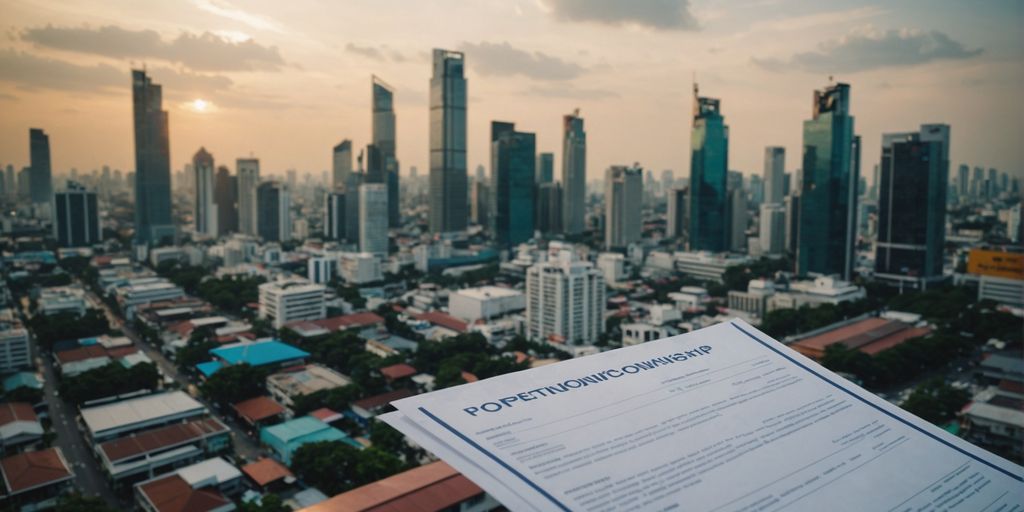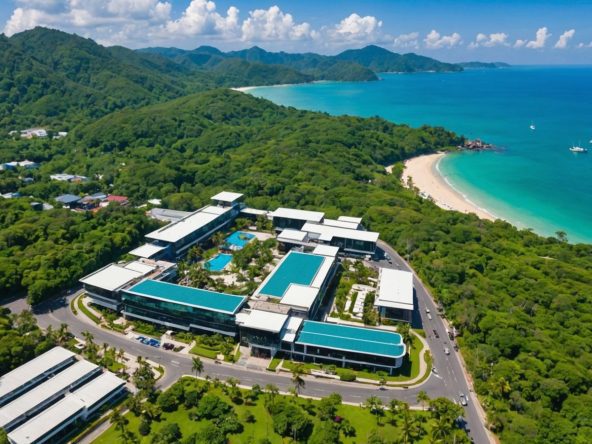Welcome to the fascinating world of foreign property ownership laws in Thailand! If you’ve ever dreamt of owning a piece of paradise in the Land of Smiles, you’re in for an exciting ride. In this article, we’ll unravel the legal intricacies surrounding the ownership of properties by foreigners in Thailand. So, let’s dive into this tropical legal adventure and discover how you can make your Thai property ownership dreams come true!
Key Takeaways
- Foreigners can own condos in Thailand, but they can’t own land directly.
- Leasehold agreements offer a viable alternative for foreigners wanting to control landed properties.
- Using Thai companies or marrying a Thai national are common methods to navigate land ownership restrictions.
- Legal advice and thorough property title searches are crucial steps before making any purchase.
- Thailand’s property market has potential changes on the horizon, which could impact foreign investment.
Legal Framework for Foreign Property Ownership in Thailand
Overview of the Land Code Act
The Land Code Act B.E. 2497 (1954) is the primary legislation governing land ownership in Thailand. Under this act, foreigners are prohibited from owning land. This restriction is a significant barrier for those looking to invest in landed properties such as houses or villas. However, there are alternative structures that allow foreigners to have legal control over the property without direct ownership.
Key Restrictions for Foreigners
Foreign nationals face several restrictions when it comes to property ownership in Thailand. The most notable is the prohibition on owning land. Foreigners can own buildings, but not the land on which they stand. This means that while you can buy a house, you cannot own the land it sits on. This rule applies to all types of landed properties, including the much-coveted Luxury Villa In Thailand.
Relevant Treaties and Exemptions
While the general rule is that foreigners cannot own land, there are some exceptions. These exceptions are usually based on treaties or specific exemptions granted by the Thai government. However, as of now, Thailand has no active treaties with any country that allow foreigners to own land. This makes it crucial for potential investors to explore other avenues, such as leasehold agreements or forming a Thai company to hold the property.
Understanding the legal framework is essential for anyone looking to invest in the Phuket Real Estate Market. Proper legal advice can help navigate these complexities and ensure a smooth transaction.
Foreigners interested in the Real Estate Phuket Thailand market should be aware of these legal constraints and plan accordingly. Whether you’re looking at Villas For Sale Thailand or other property types, knowing the law will help you make informed decisions.
Condominium Ownership for Foreigners
Legal Provisions for Condo Ownership
Foreign nationals, both individuals and legal entities, can own condominium units in Thailand. According to the 1979 Condominium Act, foreigners can own up to 49% of the total unit space in any registered condominium building. This means that if a building has already reached the 49% foreign ownership limit, no more units can be sold to foreigners. To qualify for foreign ownership, buyers must comply with Section 19 of the Thailand Condominium Act.
Ownership Quotas and Limitations
Foreigners are subject to specific ownership quotas and limitations. The total floor area of units owned by foreigners cannot exceed 49% of the entire building. This restriction ensures that a significant portion of the property remains under Thai ownership. Buyers must obtain a letter of guarantee from the condominium’s juristic person, which confirms the foreign ownership proportion. This letter must be submitted to the Land Department during the ownership transfer process.
Registration and Documentation Requirements
Purchasing a condominium in Thailand involves several steps and documentation. Foreign buyers must show evidence of an incoming remittance of foreign currency into their Thai bank account. This is typically demonstrated by a valid Tor Tor 3 form or an equivalent bank document from a Thai bank. Additionally, buyers must ensure that all legal provisions are met, including the submission of the guarantee letter to the Land Department.
It’s crucial to understand the legal framework and requirements when purchasing a condominium in Thailand. Proper documentation and adherence to regulations can prevent potential legal issues.
Foreigners interested in short term rentals should be aware of local regulations, as these can vary and may impact the profitability and legality of such investments. For those looking for Luxury Villas For Sale or the Best Luxury Villa, understanding these rules is essential to making informed decisions. The Best Beach Villas often come with their own set of regulations and limitations, so thorough research and legal advice are recommended.
Leasehold Options for Foreigners
Understanding Leasehold Agreements
Leasing is a viable option for foreigners to gain access to property in Thailand. While leasehold does not offer full ownership rights, it does provide exclusive usage rights. This means that the leaseholder can use the property without the need for ongoing paperwork. Leasehold agreements are registered on the title deed, making it a straightforward option for those looking to enjoy a property without the complexities of ownership.
Duration and Renewal Terms
The maximum duration for a lease under Thai property law is 30 years. There is an option to renew the lease for another 30 years, but this renewal must be agreed upon by the lessor. However, it’s important to note that renewal periods are often not enforceable in a contract. This makes leasing a simpler option for foreigners who want to use land without owning it.
Legal Protections for Leaseholders
Leaseholders in Thailand have certain legal protections. The leasehold rights are registered on the title deed, ensuring that the leaseholder’s rights are recognized. This can be particularly appealing for retirees looking for a holiday home. Despite the lack of ownership, leaseholders can enjoy the property with fewer legal hurdles.
Leasing is a practical solution for foreigners who wish to use property in Thailand without the complexities of ownership. It offers a straightforward way to enjoy a property while adhering to Thai laws.
Alternative Ownership Structures
Using Thai Companies for Property Ownership
Foreigners often use Thai companies to own property in Thailand. This method involves setting up a Thai company where the foreigner holds less than 49% of the shares, while Thai nationals hold the majority. This structure allows foreigners to control the property indirectly. However, it’s crucial to ensure that the company is genuinely operating and not just a shell company to avoid legal issues.
Marital Property Ownership with Thai Spouses
Foreigners married to Thai nationals can own property through their spouse. The property is registered in the Thai spouse’s name, but both parties can have a mutual agreement regarding the property’s use and benefits. This method provides a straightforward way for foreigners to have a stake in property ownership, although the legal title remains with the Thai spouse.
Usufruct, Superficies, and Habitation Rights
These legal rights allow foreigners to use and benefit from the property without owning it. A usufruct grants the right to use the property and enjoy its benefits for a specified period, often up to 30 years. Superficies allows building on the land owned by another person, while habitation rights permit living in a house owned by someone else. These rights are registered on the property title, providing legal protection to the foreigner.
While these alternative ownership structures offer viable options for foreigners, it’s essential to seek legal advice to navigate the complexities and ensure compliance with Thai laws.
Legal Safeguards and Due Diligence
Importance of Legal Advice
Engaging a qualified Thai lawyer who specializes in real estate transactions is highly recommended. They will help navigate the legal complexities and protect your interests throughout the process. Hiring a lawyer ensures that all legal aspects are thoroughly reviewed and that you are fully aware of your rights and obligations.
Conducting Property Title Searches
Performing thorough due diligence on the property you wish to purchase is crucial. Here is a quick checklist for solid due diligence when buying property in Thailand:
- Verify the authenticity of the land title deed (Chanote) and check for any encumbrances or legal disputes.
- Review leasehold agreements, including terms, conditions, and remaining lease period.
- Understand foreign ownership restrictions and explore suitable ownership structures.
- Ensure compliance with zoning laws, building regulations, and permits.
- Assess potential environmental impact and the need for environmental assessments or permits.
Understanding Contractual Obligations
Understanding the terms and conditions of your property purchase agreement is essential. This includes knowing your rights and responsibilities, payment schedules, and any penalties for breach of contract. It is important to have all agreements reviewed by a legal professional to avoid any misunderstandings or legal issues in the future.
Short term rentals are subject to specific regulations and may require additional permits or licenses. Ensure you are fully aware of these requirements to avoid legal complications.
Taxation and Fees for Foreign Property Owners

Property Transfer Fees
When foreigners buy property in Thailand, they must pay the same taxes and fees as Thai citizens. These include transfer fees, specific business tax (if applicable), stamp duty, and withholding tax. The Land Department handles the title search and updates the official records to transfer ownership to the buyer. Transfer fees are typically around 2% of the property’s appraised value.
Annual Property Taxes
Foreign property owners in Thailand are also subject to annual property taxes. These taxes are based on the assessed value of the property and are due every year. The rates can vary depending on the type and location of the property. It’s important to stay current with these payments to avoid penalties.
Tax Implications for Rental Income
If a foreigner rents out their property, they must pay taxes on the rental income. This includes both personal income tax and possibly a specific business tax. The tax rates can vary, so it’s advisable to consult with a tax professional to ensure compliance with Thai tax laws.
Staying informed about the various taxes and fees is crucial for foreign property owners in Thailand. Proper planning and professional advice can help navigate these financial obligations effectively.
Restrictions on Land Ownership

Prohibition of Land Ownership by Foreigners
In Thailand, foreigners are generally prohibited from owning land. This restriction is rooted in the Land Code Act, which aims to preserve land for Thai nationals. Foreign individuals and entities face significant hurdles when attempting to acquire land, making it a key challenge for foreign investment in real estate.
Exceptions and Special Cases
There are a few exceptions to this rule. For instance, under Section 96 bis of the Land Code Act, foreigners may be granted permission to own land, but this is rarely applied for or granted. Additionally, land ownership rights granted under this section are limited to the lifetime of the individual and are neither transferable nor inheritable.
Government Policies and Enforcement
The Thai government has been actively discouraging the misuse of Thai companies to circumvent these restrictions. Since 2006, there have been stricter regulations and enforcement measures to prevent partly foreign-owned companies from illegally owning land. This has led to increased scrutiny and legal challenges for such entities.
Foreigners looking to invest in Thai real estate should be aware of these stringent restrictions and consider alternative ownership structures or leasehold options.
Commercial Property Ownership
Regulations for Commercial Real Estate
Foreigners looking to invest in commercial real estate in Thailand must navigate a complex legal landscape. Foreign ownership of land is generally prohibited, but there are exceptions and specific structures that can be utilized. For instance, foreign businesses can lease land for up to 30 years, with an option to renew. Additionally, the Board of Investment (BOI) may grant special privileges to certain types of businesses, allowing them to own land.
Investment Opportunities and Risks
Thailand offers a range of investment opportunities in commercial real estate, from office spaces to retail outlets. However, potential investors should be aware of the risks involved. Market fluctuations, regulatory changes, and economic conditions can impact the profitability of investments. It’s crucial to conduct thorough due diligence and seek professional advice before making any commitments.
Legal Compliance for Foreign Businesses
Foreign businesses must comply with various legal requirements to operate in Thailand. This includes obtaining the necessary permits and licenses, adhering to zoning laws, and ensuring that their operations do not violate any local regulations. Failure to comply with these requirements can result in fines, legal action, or even the revocation of business licenses.
Navigating the legal landscape of commercial property ownership in Thailand requires careful planning and professional guidance. Ensuring compliance with local laws and regulations is essential for the success of any foreign investment.
Future Trends and Potential Changes
Proposed Legal Reforms
Thailand’s real estate market is on the brink of significant changes. Proposals to amend foreign property ownership laws have been discussed, especially in light of the economic impact of the COVID-19 pandemic. One notable proposal is to increase the foreign ownership quota in condominiums from 49% to potentially 70-80%. This change aims to rejuvenate the real estate sector by attracting more foreign investment.
Impact on Foreign Investment
If these proposed reforms are implemented, they could lead to a surge in foreign investment. The extended land lease terms, from the current 30 years to 50 years, are also under consideration. These changes would make Thailand a more attractive destination for long-term foreign investors. However, it’s important to note that these reforms are still speculative and have not been confirmed by the government.
Expert Opinions and Predictions
Experts are divided on the potential impact of these changes. Some believe that increasing the foreign ownership quota and extending lease terms will significantly boost the market. Others caution that these changes could face resistance due to the controversial nature of foreign property ownership in Thailand. The government’s focus remains on immediate concerns, such as managing the ongoing COVID-19 situation, which may delay any potential reforms.
While the proposed changes are promising, they remain speculative. Investors should stay informed and consult legal experts to navigate the evolving landscape.
The future of real estate is evolving rapidly, with new trends and changes on the horizon. Stay ahead of the curve by visiting our website. Discover the latest insights and opportunities in the market. Don’t miss out on your dream property!
Conclusion
Navigating the landscape of foreign property ownership in Thailand can be challenging, but it’s not impossible. While the laws are strict, especially regarding land ownership, there are still viable options for foreigners, such as owning condominiums or entering into leasehold agreements. By thoroughly understanding these regulations and seeking proper legal advice, you can make informed decisions and potentially own a piece of this beautiful country. Whether you’re drawn to the vibrant life of Bangkok or the serene beaches of Phuket, Thailand’s real estate market offers opportunities for those willing to navigate its complexities.




